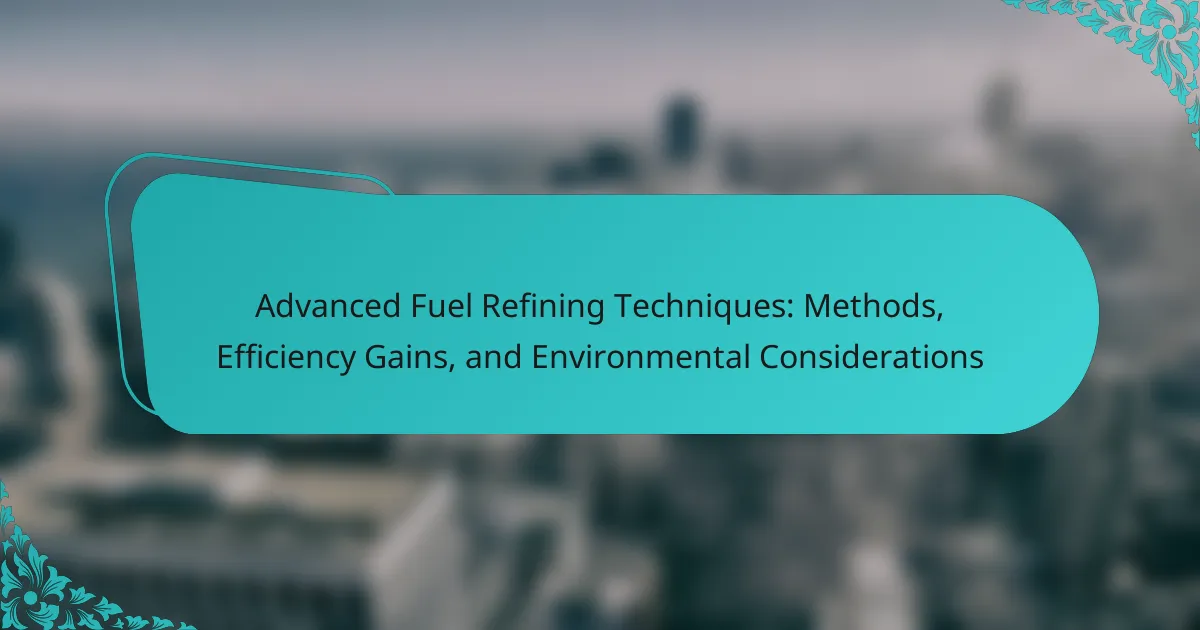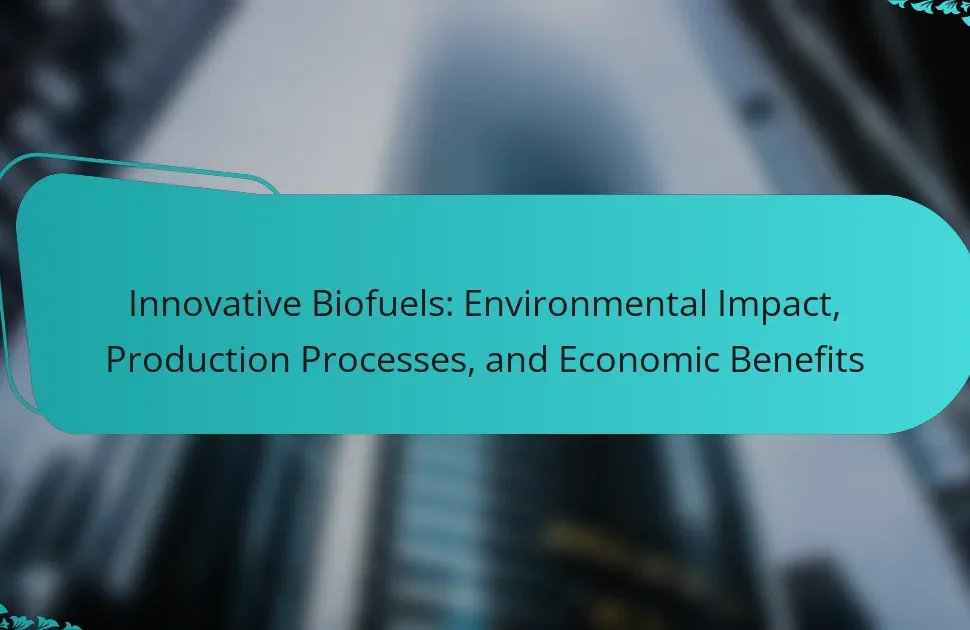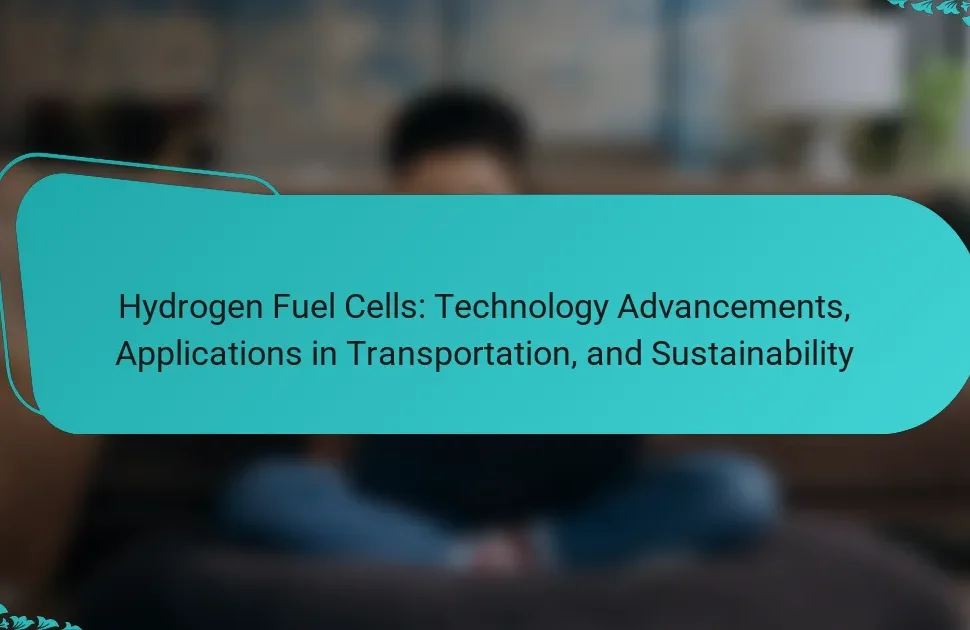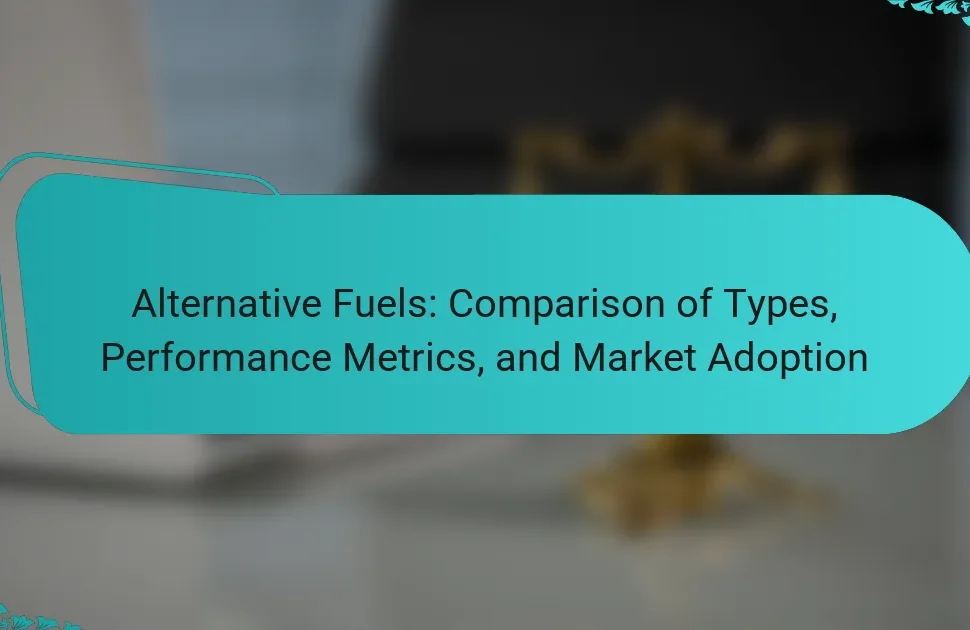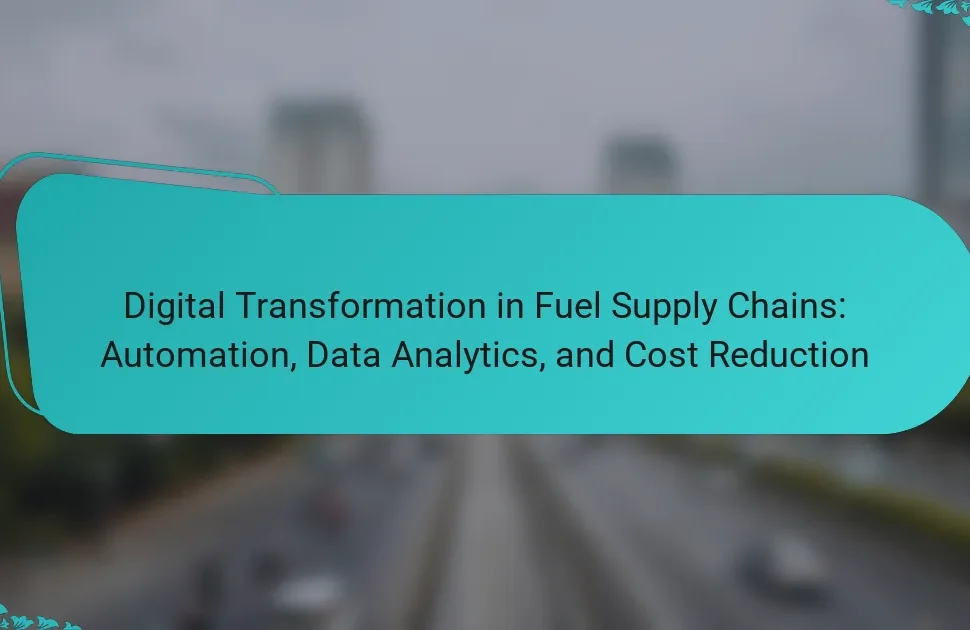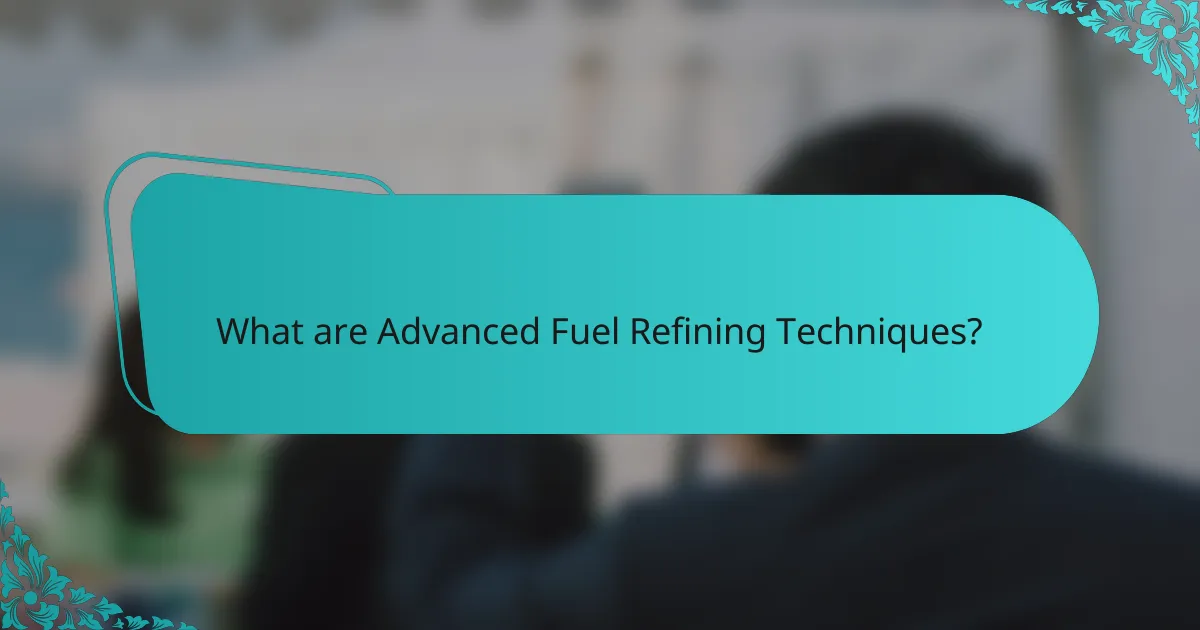
What are Advanced Fuel Refining Techniques?
Advanced fuel refining techniques are innovative processes that enhance the quality and efficiency of fuel production. These methods include hydrocracking, catalytic reforming, and alkylation. Hydrocracking converts heavy oils into lighter, more valuable products using hydrogen and catalysts. Catalytic reforming improves the octane rating of gasoline by rearranging hydrocarbon molecules. Alkylation combines smaller hydrocarbons to produce high-octane components for gasoline. These techniques result in cleaner fuels with reduced emissions. They also support compliance with environmental regulations. Advanced refining processes are crucial for meeting the growing demand for sustainable energy solutions.
How do Advanced Fuel Refining Techniques differ from traditional methods?
Advanced fuel refining techniques utilize modern technologies that significantly enhance efficiency compared to traditional methods. Traditional refining often relies on simple distillation and cracking processes. Advanced techniques incorporate methods like hydrocracking and catalytic reforming. These methods improve yield and quality of fuel products. For instance, hydrocracking can convert heavier fractions into lighter, more valuable fuels. Additionally, advanced techniques often reduce energy consumption during refining. According to a study by the U.S. Department of Energy, advanced methods can increase overall efficiency by up to 20%. This improvement not only boosts productivity but also lowers greenhouse gas emissions. Thus, advanced refining techniques represent a significant evolution in fuel processing compared to traditional methods.
What are the key characteristics of Advanced Fuel Refining Techniques?
Advanced fuel refining techniques are characterized by their ability to enhance fuel quality and efficiency. These techniques often utilize advanced catalysts to improve reaction rates and selectivity. They also incorporate innovative separation processes to maximize product yield. Additionally, they focus on reducing environmental impact through lower emissions. Advanced techniques often include integrated processes that combine multiple refining stages. They aim to produce cleaner fuels that meet stringent regulatory standards. Furthermore, these methods are designed to optimize energy consumption during refining. Overall, advanced fuel refining techniques represent a significant evolution in the industry, aligning with sustainability goals.
Why are these techniques important in today’s energy landscape?
Advanced fuel refining techniques are crucial in today’s energy landscape due to their ability to enhance efficiency and reduce environmental impact. These methods improve the yield of high-quality fuels from crude oil. They also enable the production of cleaner fuels that meet stringent regulatory standards. Techniques such as hydrocracking and hydrotreating minimize harmful emissions. According to the U.S. Energy Information Administration, refining processes have become more energy-efficient over the last decade. This efficiency leads to lower operational costs and reduced carbon footprints. Additionally, these techniques support the transition to sustainable energy sources. By optimizing fuel production, they contribute to energy security and economic stability.
What are the main types of Advanced Fuel Refining Techniques?
The main types of advanced fuel refining techniques include hydrotreating, hydrocracking, and catalytic reforming. Hydrotreating removes sulfur and nitrogen compounds from crude oil. It enhances fuel quality and meets environmental regulations. Hydrocracking breaks down heavy hydrocarbons into lighter products. This process increases yield and improves fuel properties. Catalytic reforming converts naphtha into high-octane gasoline. It also produces hydrogen for other refining processes. Each technique contributes to more efficient fuel production and lower emissions.
How does hydrocracking contribute to fuel refinement?
Hydrocracking significantly enhances fuel refinement by breaking down large hydrocarbon molecules into smaller, more valuable products. This process occurs in the presence of hydrogen and a catalyst at high temperatures and pressures. Hydrocracking increases the yield of high-quality fuels such as gasoline and diesel. It effectively removes impurities like sulfur and nitrogen, improving fuel quality. The process also converts heavy oils and residues into lighter, more desirable fractions. According to the U.S. Energy Information Administration, hydrocracking can improve the overall efficiency of refineries, leading to better economic returns. This technique plays a crucial role in meeting stringent environmental regulations by producing cleaner fuels.
What role does catalytic reforming play in fuel quality improvement?
Catalytic reforming enhances fuel quality by increasing the octane rating of gasoline. This process converts low-octane naphthas into high-octane reformate. Catalytic reforming also reduces the concentration of undesirable components like sulfur and benzene. The process utilizes catalysts, typically platinum-based, to facilitate the chemical reactions. It operates at high temperatures and pressures, optimizing the yield of valuable hydrocarbons. Studies indicate that reformate can contain up to 90% aromatics, which are beneficial for engine performance. Overall, catalytic reforming significantly contributes to producing cleaner-burning fuels.
What efficiency gains can be achieved through Advanced Fuel Refining Techniques?
Advanced fuel refining techniques can achieve significant efficiency gains, primarily through improved yield and reduced energy consumption. These techniques enhance the conversion rates of crude oil into valuable products. For instance, advanced catalytic processes can increase gasoline yield by up to 15%. Additionally, innovations like hydrocracking improve the quality of fuel while using less energy compared to traditional methods. Studies show that implementing these techniques can reduce refining energy requirements by approximately 10-20%. Such advancements not only optimize resource use but also lower operational costs, making refining processes more sustainable and economically viable.
How do these techniques enhance energy output?
Advanced fuel refining techniques enhance energy output by improving fuel quality and combustion efficiency. These methods include hydrocracking and catalytic reforming. Hydrocracking breaks down heavy hydrocarbons into lighter, more combustible fuels. This process increases the energy density of the fuel. Catalytic reforming alters the molecular structure of hydrocarbons to produce higher-octane fuels. Higher octane fuels burn more efficiently in engines, leading to better energy output.
Research shows that these techniques can increase energy output by up to 15% compared to traditional refining methods. For instance, the U.S. Department of Energy reports that advanced refining can lead to significant reductions in emissions while maximizing energy yield. Enhanced fuel properties result in improved engine performance and reduced fuel consumption.
What are the economic benefits of implementing Advanced Fuel Refining Techniques?
Implementing Advanced Fuel Refining Techniques offers significant economic benefits. These techniques can lead to reduced operational costs by improving energy efficiency. Enhanced refining processes increase the yield of valuable products, maximizing profit margins. Additionally, lower emissions can result in reduced regulatory compliance costs. The use of advanced technologies can also create job opportunities in the sector. According to a report by the International Energy Agency, improved refining efficiency can save up to 10% in operational costs. Overall, these techniques contribute to a more competitive and sustainable fuel industry.
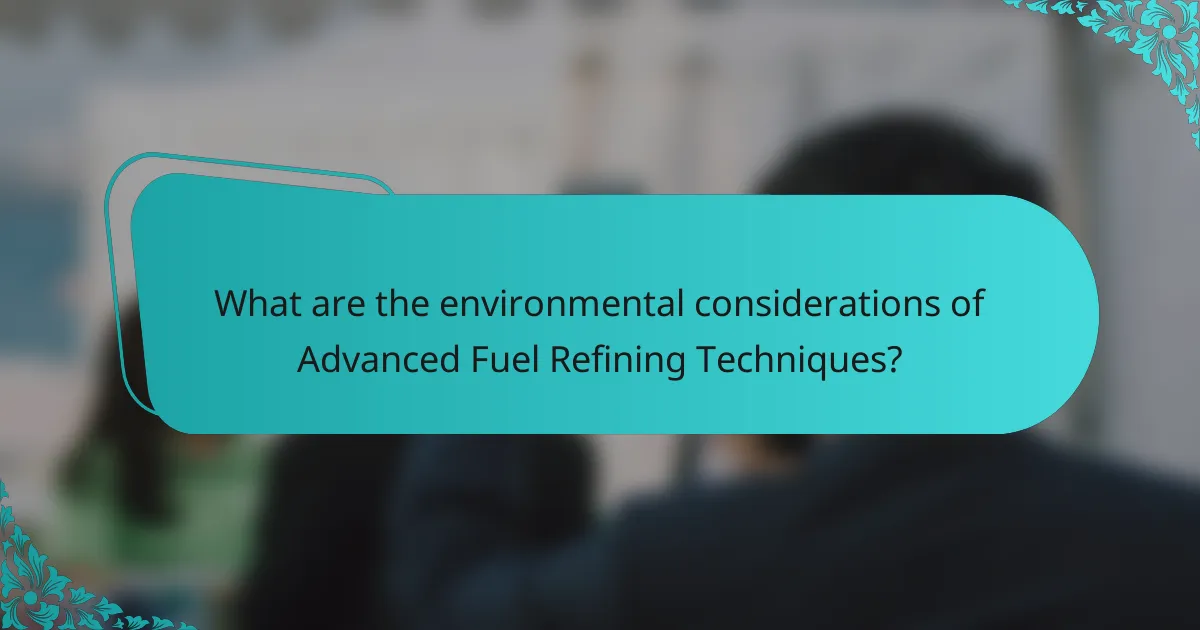
What are the environmental considerations of Advanced Fuel Refining Techniques?
Advanced fuel refining techniques have significant environmental considerations. These methods can lead to reduced greenhouse gas emissions. For instance, advanced technologies like hydrocracking and hydrotreating enhance fuel quality while minimizing pollutants. The use of catalysts in refining processes can lower energy consumption. Additionally, these techniques can facilitate the conversion of waste materials into usable fuels. However, the production of some advanced fuels may still generate harmful byproducts. Effective waste management and emissions control are essential in mitigating environmental impacts. Regulatory frameworks often guide these considerations to ensure sustainable practices in fuel refining.
How do Advanced Fuel Refining Techniques impact emissions?
Advanced fuel refining techniques significantly reduce emissions. These methods enhance the efficiency of fuel production. Techniques like hydrocracking and catalytic reforming decrease sulfur and aromatic compounds. Lower sulfur content leads to reduced sulfur dioxide emissions during combustion. Catalytic processes improve the overall combustion efficiency of fuels. Enhanced combustion efficiency results in lower carbon monoxide and unburned hydrocarbon emissions. Studies indicate that advanced refining can reduce greenhouse gas emissions by up to 30%. This evidence supports the claim that these techniques have a positive impact on emissions.
What measures are taken to reduce environmental impact?
Advanced fuel refining techniques implement several measures to reduce environmental impact. These measures include the adoption of cleaner technologies that minimize emissions during the refining process. For instance, using hydrocracking and hydrotreating can significantly lower sulfur content in fuels. Additionally, advanced catalytic processes enhance fuel efficiency and reduce greenhouse gas emissions. Implementing energy-efficient systems also contributes to lower energy consumption in refineries. Many refineries are now integrating carbon capture and storage technologies to mitigate CO2 emissions. Furthermore, regulatory compliance with environmental standards ensures that refineries operate within limits that protect air and water quality. These combined efforts demonstrate a commitment to reducing the ecological footprint of fuel production.
How do regulations influence the adoption of these techniques?
Regulations significantly influence the adoption of advanced fuel refining techniques. They establish standards for emissions, safety, and efficiency that refiners must comply with. Stricter regulations often drive innovation as companies seek to meet these requirements. For instance, regulations on sulfur content in fuels have led to the development of hydrocracking and hydrotreating methods. Compliance can require substantial investment in new technologies, impacting financial decisions. Additionally, regulations can create market demand for cleaner fuels, encouraging the adoption of advanced techniques. Countries with stringent environmental regulations, like the EU, often see faster adoption of these methods compared to regions with lax regulations.
What are the sustainability aspects of Advanced Fuel Refining Techniques?
Advanced Fuel Refining Techniques enhance sustainability through reduced emissions and efficient resource use. These techniques often involve advanced catalysts and processes that lower greenhouse gas emissions during fuel production. For instance, hydrocracking and hydrotreating improve fuel quality while minimizing waste. They also enable the processing of renewable feedstocks, which further decreases reliance on fossil fuels. Studies show that these techniques can reduce carbon dioxide emissions by up to 30% compared to traditional methods. Additionally, they promote energy recovery and recycling of by-products, contributing to a circular economy. Overall, Advanced Fuel Refining Techniques support sustainable energy transitions by improving environmental performance.
How do these techniques promote resource conservation?
Advanced fuel refining techniques promote resource conservation by maximizing the efficiency of fuel production. These techniques reduce waste during the refining process. They also enhance the yield of usable fuel from raw materials. For example, methods like hydrocracking and catalytic reforming optimize the conversion of crude oil into high-quality fuels. This results in lower energy consumption and reduced emissions. According to the U.S. Department of Energy, advanced refining processes can increase energy efficiency by up to 10%. Consequently, these techniques contribute to sustainable energy practices and reduce the overall demand for fossil fuels.
What innovations are being developed to enhance sustainability in fuel refining?
Innovations to enhance sustainability in fuel refining include advanced catalysts and carbon capture technologies. These catalysts improve the efficiency of chemical reactions, reducing energy consumption. Carbon capture technologies capture CO2 emissions during the refining process. This mitigates greenhouse gas emissions. Additionally, biorefining methods convert biomass into fuels, promoting renewable resources. Process optimization techniques are also being developed. These techniques streamline operations and minimize waste. Research shows that these innovations can significantly lower the environmental impact of fuel refining. For example, a study by the National Renewable Energy Laboratory highlights the potential for reducing carbon emissions by up to 50% with these advancements.
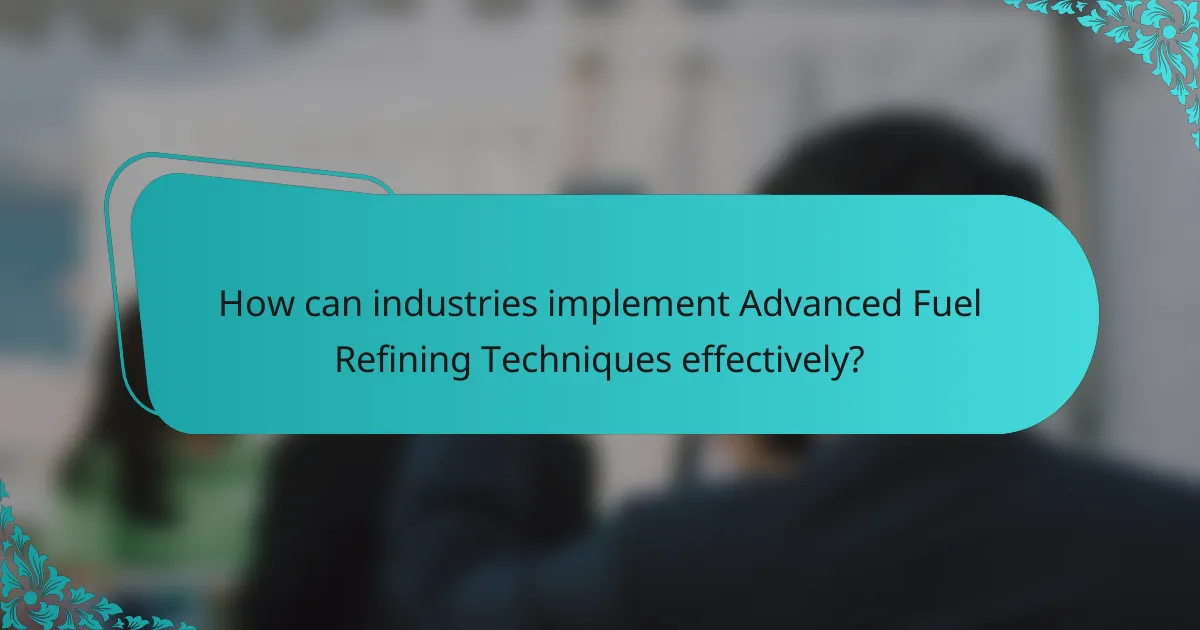
How can industries implement Advanced Fuel Refining Techniques effectively?
Industries can implement Advanced Fuel Refining Techniques effectively by adopting a systematic approach. This includes investing in modern technologies such as hydrocracking and hydrotreating. These methods enhance the quality of fuel by removing impurities. Additionally, optimizing process parameters can increase efficiency and yield. Training staff on new techniques ensures proper implementation. Regular maintenance of equipment minimizes downtime and improves reliability. Collaborating with research institutions can provide insights into the latest advancements. According to the U.S. Energy Information Administration, improved refining processes can lead to significant reductions in emissions.
What best practices should industries follow when adopting these techniques?
Industries should prioritize thorough research and feasibility studies when adopting advanced fuel refining techniques. Understanding the specific methods available is crucial. Each technique has unique efficiency gains and environmental impacts. Training staff on new technologies ensures smooth implementation. Regular monitoring of performance metrics is essential for ongoing optimization. Compliance with environmental regulations must be strictly maintained. Collaboration with technology providers can enhance innovation and problem-solving. Finally, sharing best practices within the industry fosters a culture of continuous improvement.
How can companies measure the success of their fuel refining strategies?
Companies can measure the success of their fuel refining strategies through key performance indicators (KPIs). These KPIs include yield efficiency, which assesses the amount of usable fuel produced from raw materials. Another important metric is operational cost, which evaluates expenses associated with the refining process. Environmental impact is also crucial; companies can track emissions reductions and waste management efficiency.
Additionally, market share growth can indicate successful strategies in meeting consumer demand. Safety performance metrics, such as incident rates, reflect the effectiveness of operational practices. Regular benchmarking against industry standards provides context for performance evaluation.
According to the U.S. Energy Information Administration, refining margins can also serve as a financial measure of success, reflecting the profitability of refining operations. These combined metrics provide a comprehensive assessment of the effectiveness of fuel refining strategies.
What common challenges do industries face in Advanced Fuel Refining?
Industries face several common challenges in Advanced Fuel Refining. One major challenge is the high capital investment required for advanced technologies. These technologies often involve complex processes that demand significant financial resources. Another challenge is regulatory compliance with stringent environmental standards. Industries must adhere to regulations that govern emissions and waste management. Additionally, there is the issue of feedstock variability. Different crude oil qualities can affect refining efficiency and product yield. Operational complexity also poses a challenge. Advanced refining processes require skilled personnel and sophisticated management systems. Finally, market volatility can impact profitability. Fluctuations in oil prices can affect the economic feasibility of advanced refining projects.
How can these challenges be overcome?
Challenges in advanced fuel refining can be overcome through the implementation of innovative technologies. Adopting advanced catalytic processes improves efficiency and reduces energy consumption. Utilizing membrane separation techniques enhances product purity and minimizes waste. Integrating renewable energy sources into refining operations can lower greenhouse gas emissions. Regular investment in research and development fosters continuous improvement in refining methods. Collaboration between industry stakeholders can drive the adoption of best practices and knowledge sharing. These strategies have been shown to significantly enhance operational performance in various case studies across the industry.
What resources are available for industries looking to improve their refining processes?
Industries looking to improve their refining processes can utilize various resources. These include advanced technologies such as hydrocracking and catalytic reforming. Research papers provide insights into efficiency gains and environmental considerations. Industry-specific training programs enhance workforce skills in refining techniques. Consulting services offer tailored solutions to optimize operations. Additionally, government regulations and incentives promote sustainable practices. Collaboration with research institutions can lead to innovative refining methods. Industry conferences and workshops facilitate knowledge sharing and networking opportunities.
Advanced fuel refining techniques are innovative processes aimed at enhancing the quality and efficiency of fuel production while reducing environmental impact. Key methods include hydrocracking, catalytic reforming, and alkylation, each contributing to improved fuel yield, octane ratings, and cleaner emissions. The article explores how these techniques differ from traditional refining methods, their economic benefits, and the significant efficiency gains they offer. Additionally, it addresses the environmental considerations and regulatory influences that shape the adoption of these advanced techniques in the fuel industry.
